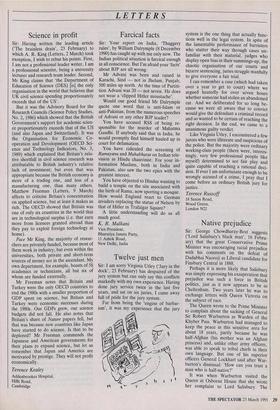LETTERS Science in profit
Sir: Having written the leading article (`The brainless drain', 23 February) to which A. R. King (Letters, 2 March) took exception. I wish to rebut his points. First, I am not a professional leader writer, I am a professional scientist, being a university lecturer and research team leader. Second, Mr King claims that 'the Department of Education of Science (DES) [is] the only organisation in the world that believes that UK civil science spending proportionately exceeds that of the US'.
But it was the Advisory Board for the Research Councils (Science Policy Studies, No. 2, 1986) which showed that the British Government's support for academic scien- ce proportionately exceeds that of the US (and also Japan and Switzerland). It was the Organisation for Economic Co- operation and Development (OECD Sci- ence and Technology Indicators, No. 3, 1989) which explained that Britain's rela- tive shortfall in civil science research was attributable to British industry's relative lack of investment; but even that was appropriate because the British economy is more of a trading one, and less of a manufacturing one, than many others. Matthew Freeman (Letters, 9 March) affects to criticise Britain's concentration on applied science, but at least it makes us rich. The OECD showed that Britain was one of only six countries in the world that are in technological surplus (i.e. that earn more from licences granted abroad than they pay to exploit foreign technology at home). Pace Mr King, the majority of resear- chers are privately funded, because most of them work in industry; but even within the universities, both private and short-term sources of money are in the ascendant. My own department, for example, boasts of 58. academics or technicians, all but six of whom are funded externally.
Mr Freeman notes that Britain and Turkey were the only OECD countries to end the 1980s with a smaller proportion of GDP spent on science, but Britain and Turkey were economic successes during the 1980s. Our GDPs grew, our science budgets did not fall. He also notes that Britain's share of Nature papers fell, but that was because new countries like Japan have started to do science. Is that to be deplored? Mr Freeman commends the Japanese and American governments for their plans to expand science, but let us remember that Japan and America are motivated by prestige. They will not profit economically.
Terence Kealey
Addenbrookes Hospital, Hills Road, Cambridge


























































 Previous page
Previous page